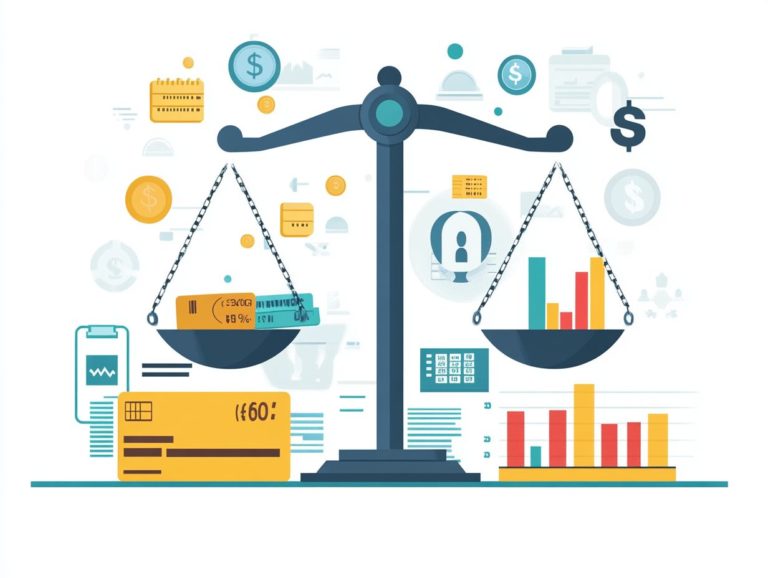The Importance of Consistency in Credit Management
Credit management is essential to your business’s financial health, affecting everything from cash flow to overall stability.
Inconsistent credit practices can lead to serious problems, impacting both your finances and operations.
This article delves into what credit management means and why it matters. It examines the pitfalls of inconsistency and the substantial benefits of a steady approach.
You ll also find practical strategies and real-life case studies that showcase successful credit management. These insights can bolster your business’s financial resilience.
Contents
- Key Takeaways:
- Definition of Credit Management
- The Impact of Inconsistent Credit Management
- The Benefits of Consistent Credit Management
- Strategies for Maintaining Consistency
- Case Studies on Successful Credit Management
- Frequently Asked Questions
- Why is consistency key in credit management?
- How does consistency in credit management affect my credit score?
- Why is it important to regularly check my credit report?
- What happens if I am inconsistent in my credit management?
- How can I maintain consistency in my credit management?
- Are there any benefits to being consistent in credit management?
Key Takeaways:

- Consistency in credit management is crucial for businesses to maintain financial stability and a positive cash flow.
- Poor credit management can have negative effects on a company’s finances and operations.
- Effective strategies such as implementing credit policies, utilizing technology, and learning from real-life case studies help businesses maintain consistency in credit management.
Definition of Credit Management
Credit management involves the strategies and practices you employ to maintain your credit health, vital in the financial landscape. It influences everything from your personal finance decisions to your ability to secure loans for significant life milestones, such as purchasing a home or a car.
By establishing effective credit policies and evaluating creditworthiness, credit management gives you the power to navigate your credit history and financial habits. This ultimately shapes your financial future.
Understanding the Role and Purpose
The role and purpose of credit management revolve around your ability to effectively oversee and control various aspects of your credit accounts and payment behavior. This ensures a positive credit score that reflects your creditworthiness.
A comprehensive approach is required, which includes diligently monitoring your credit scores. These scores serve as a crucial indicator of your financial reliability.
Managing multiple credit accounts is vital. It involves assessing your balances, payment dates, and interest rates to maximize benefits while minimizing risks.
Understanding your payment behavior shapes your credit decisions and helps you devise strategies to encourage timely payments. This nurtures a robust credit history that lenders highly value.
The Impact of Inconsistent Credit Management
Poor credit management can lead to serious problems that profoundly affect both personal and business finances. It can undermine your financial stability, disrupt your cash flow, and tarnish your creditworthiness through damaging credit inquiries and a less-than-stellar payment history.
Stay disciplined with your credit management to secure a bright financial future!
Negative Effects on Finances and Business Operations

The negative effects of poor credit management on your finances and business operations can manifest in various ways. You may face increased credit risk due to high credit utilization and a weak payment history, jeopardizing your financial stability.
When you or your business fail to manage credit effectively, it s easy to get trapped in a cycle of debt that’s increasingly difficult to escape. This scenario raises the likelihood of missed payments and adversely affects your overall credit score.
Excessive credit card usage can lead to a concerning debt-to-income ratio, intensifying the risks associated with obtaining new credit. Poor management practices limit your borrowing capacity and can tarnish your reputation among lenders, diminishing your future opportunities for growth and investment.
The Benefits of Consistent Credit Management
Consistent credit management offers a wealth of benefits that significantly enhance your cash flow and financial stability.
By mastering this practice, you bolster your ability to make on-time payments, uphold a positive credit report, and cultivate healthier financial habits that lead to improved credit scores.
Improved Cash Flow and Financial Stability
Effective credit management can lead to improved cash flow and financial stability. It allows you to optimize your credit utilization ratio the amount of credit you use compared to what you have available and manage your credit limits with finesse.
By finding the right balance between your available credit and current debt, credit management gives you the power to maintain a healthy credit utilization ratio ideally below 30%. This strategic approach not only reduces the risk of overspending but also strengthens your credit score, paving the way for more favorable loan terms and lower interest rates.
Regularly monitoring your credit limits ensures that your financial obligations remain well within your capacity to repay. These practices truly boost your financial health, enabling you to confidently navigate unforeseen expenses or make strategic investments when opportunities arise.
Strategies for Maintaining Consistency
To maintain consistency in credit management, adopt effective strategies that include establishing robust credit policies, implementing sound risk management techniques, and utilizing efficient collection methods.
This approach helps ensure timely payments and fosters healthy financial habits for both you and your organization.
Effective Credit Policies and Procedures

Effective credit policies and procedures are crucial for success in credit management. They lay down clear guidelines for assessing the ability to repay loans, executing efficient collection efforts, and managing financial statements to achieve accurate credit scoring.
These frameworks enhance your decision-making processes and help mitigate the risks associated with lending. By integrating systematic risk assessments and approval controls, you can evaluate potential borrowers more effectively and ensure they meet your established criteria.
Robust collection strategies are vital for maintaining healthy cash flow. They enable you to recover dues efficiently while preserving valuable customer relationships. Staying informed about regulatory changes and market trends ensures that your credit management practices remain relevant and advantageous, ultimately boosting your performance and reputation in the financial landscape.
Utilizing Technology and Automation
Utilizing technology and automation in credit management can greatly enhance your efficiency, allowing you to monitor payments effectively and secure a more promising financial future.
By leveraging advanced software solutions and data analytics, you can streamline your credit evaluation processes, swiftly identify potential risks, and optimize your decision-making. The integration of automated reminders and alerts will help you reduce late payments, ultimately improving your cash flow. With real-time monitoring of accounts, you can maintain accurate records and ensure timely interventions when necessary.
These improvements mitigate the risks associated with unpaid debts and foster stronger relationships with your clients. Clients feel supported and informed throughout the credit lifecycle. Embracing technology leads to a more sustainable and profitable financial management strategy.
Case Studies on Successful Credit Management
Case studies on successful credit management offer invaluable insights into effective practices that can significantly enhance your financial stability and creditworthiness. These examples provide lessons learned applicable to various financial situations and businesses, empowering you to make informed decisions that drive success.
Real-Life Examples and Lessons Learned
Real-life examples of credit management success provide valuable lessons in financial management. They show how a positive credit history and strong business relationships can lead to long-term financial rewards.
When you make timely payments, you boost your credit score and build trust with suppliers. This often results in better terms and discounts.
For example, a small retailer that adopted strict payment schedules saw a 20% reduction in costs due to suppliers offering favorable credit terms.
Keeping an eye on cash flow and engaging in planning for future financial needs helps you anticipate financial challenges. Using technology, like automated invoicing and payment reminders, can greatly enhance your credit management processes.
Frequently Asked Questions

Why is consistency key in credit management?
Consistency in credit management is crucial for maintaining a good credit score and financial stability. It ensures that you make timely payments and manage your credit responsibly, positively impacting your creditworthiness.
How does consistency in credit management affect my credit score?
Consistency is a key factor in your credit score. By making on-time payments and keeping your credit utilization low, you can improve your score and demonstrate to creditors that you are a responsible borrower.
Why is it important to regularly check my credit report?
Regularly checking your credit report is crucial. Catching errors or fraud early can save you from long-term damage to your credit score.
What happens if I am inconsistent in my credit management?
Inconsistent management can lead to a lower credit score, making it harder to obtain loans or credit cards in the future. It may also cause missed or late payments, resulting in additional fees and interest charges.
How can I maintain consistency in my credit management?
You can maintain consistency by creating a budget, setting up automatic payments, and regularly monitoring your credit report. Avoiding excessive debt and paying your bills on time is also important.
Are there any benefits to being consistent in credit management?
Yes, consistent credit management leads to a healthier credit score, better financial stability, and access to more favorable loan and credit card terms. It can also help you avoid financial stress and improve your overall well-being.






